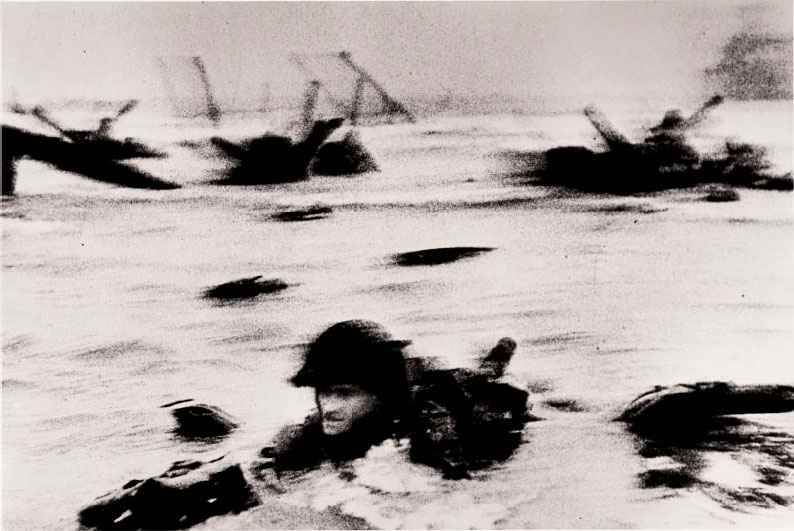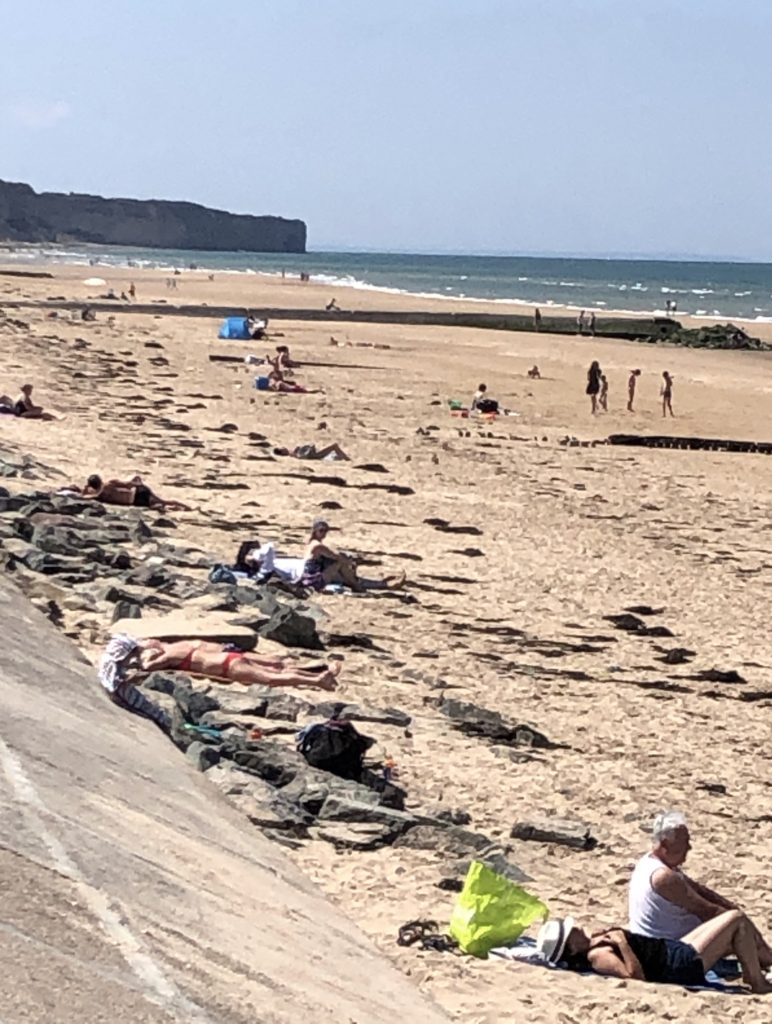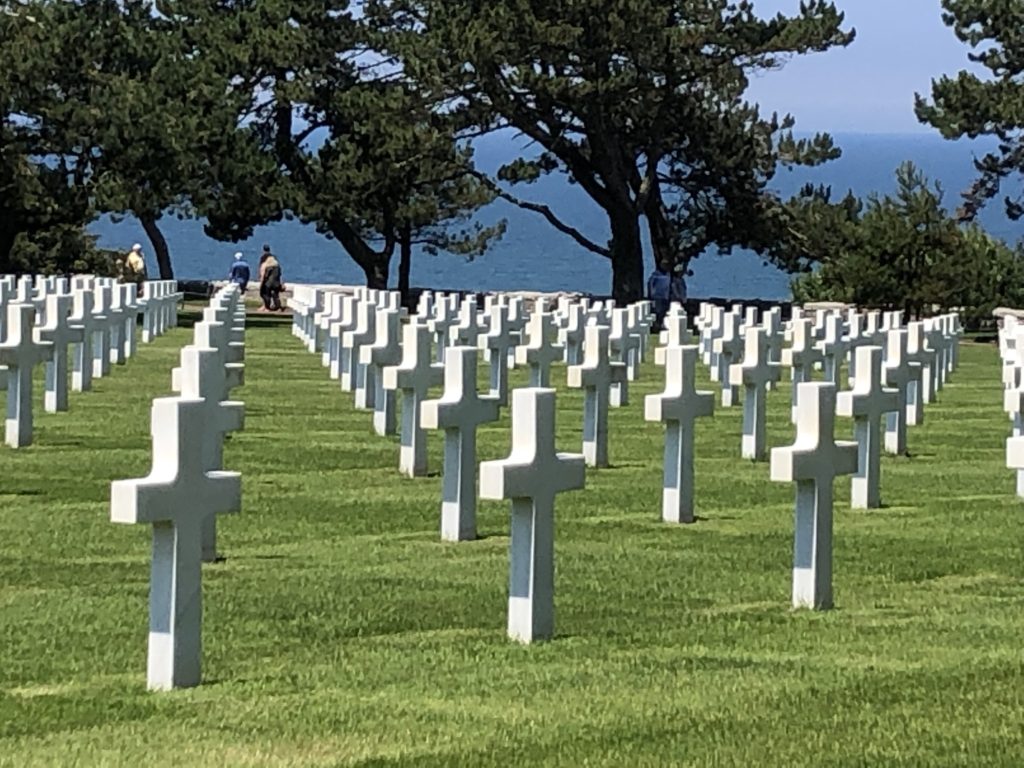It could have been any beach anywhere. There was sand, a stiff breeze and tourists soaking up the summer sun’s rays. Gulls floated playfully on the stiff sea breeze as whitecaps teased the shore. Waves crashed angrily as a distant storm pushed the sea into the land. A similar storm had also tormented this very shoreline 75 years ago. Today, though, a circle would be completed. The death of a body finally reconciled with the death of a soul. A lone man walked purposefully along the beach near Vierville-sur-Mer, France. That beach’s name is one that is etched in history books:
Omaha Beach — A place that once was an open fissure that led straight to Hell.
The man walking toward the English Channel carried a small container. He kept it close to his heart, as it was precious to him. In it contained the answer to a secret that had been kept from him up until recently. In it was the remains of a broken man.

That man, Private John Riley O’Rouke, had been on the first wave to storm Omaha Beach on June 6, 1944. As he and his friends closed into the range of the German guns, vomit and sweat quickly turned into blood. Bullets ripped through the Higgins’ boat’s ramp, killing men O’Rouke had trained with, eaten with, marched with, drank with and been friends with. They were his brothers. His drinking buddies. A mortar shell exploded directly in the middle of the landing craft next his, sending body parts flying through the air. That’s the moment when O’Rouke discovered the human body is no match for burning razor-sharp steel. Then his best friend Sam Reynolds took a bullet to the head. His brains exploded on O’Rouke’s face.
O’Rouke prayed but God wasn’t there. No, this was strictly men facing Satan’s wrath.
As fire continued to rip through the boat, the Higgins’ boat’s coxswain panicked and let the gate down too far from the shore. Another round of machine gun fire erupting with another spray of bullets ripping through the men once again. But for some reason, O’Rouke wasn’t hit. He leapt over the side of the boat, shucking his gear so he wouldn’t drown. And he was one of the few who didn’t. Gasping and crying, he pulled himself past his drowned friends and onto the shore. There he hid behind an obstacle as fire rained down around him. Vomit trickled down his blood covered chin.
Seconds became hours. Hours became a lifetime. When the second wave came ashore, he composed himself just enough to push forward with them. Bullets whizzed past his head repeatedly but O’Rouke didn’t notice. As far as he cared, he was already dead. That evening, Private John Riley O’Rouke, covered in the blood of his friends, was one of the few from the first wave get off Omaha Beach alive and relatively unscathed. But while he wasn’t physically hurt, his soul died a grisly death.
J.R. O’Rouke had never known much about the man who had walked away from the family when he was just a little kid. According to his grandmother, he was the town drunk and had once tried to kill her while she slept. She said he was screaming something about Germans as he choked her before she managed to hit him with a candle stick and drive him off. He left and managed to go through a series of jobs that paid him just enough to pay for the alcohol that he used to drown his pain like his friends had drowned. J.R. had never known his grandfather had been on this beach on D-Day. The family, being good Church-going folks, didn’t talk about him. J.R. would see him wandering around town but he was too afraid to speak to him. He was a monster after all. Then in the summer of 1995, his grandfather disappeared once and for all. J.R. would never know the truth.
Or so he thought.
The first crack in the family’s Fort Knox-like story about his grandfather came with the release of the classic Spielberg war movie Saving Private Ryan. He remembered his grandmother crying when it was released. She told him not to go see it but of course, he went anyway. Walking out of the theater he thought, “how did those guys ever move on with their lives?”
He had no idea his grandfather was one of those guys.
Then while cleaning out his grandmother’s house, he found the next clue in a chest in her attic. In it were newspaper clippings from the war and a chest full of medals. Ernie Pyle, the Great War correspondent had mentioned his grandfather’s heroic action that day. How he had helped break the German defenses and taken out a pillbox with hand grenades. He picked up and held a Silver Star his grandfather had received for his heroism. But that couldn’t be true, could it? He had heard the stories and the whispers around town. His grandfather wasn’t a hero. He was a just a worthless drunk. Right? Right?!?
The waves crashed louder as the wind began to howl. Sand swirled around, stinging his face as he approached the water’s edge. J.R. took off his shoes and began to walk out into the water. He felt a riptide pull him toward the open sea. He clutched the container even tighter.
Like his grandfather 75 years ago, he had a mission to complete.
John Riley O’Rouke had died alone in a V.A. nursing home at the age of 95. Because J.R.’s name was the same as his grandfather’s, a kind nurse had broken protocol and located him. He wanted the old man, the one patient who had never had visitors, to have some dignity in death. J.R. remembered the phone call. “Are you related to John Riley O’Rouke? J.R. nearly dropped the phone. “He’s alive?” J.R. replied. He immediately called his dad and both men traveled to identify the body. John Riley O’Rouke was dead alright. But in reality, he had died on the morning of June 6, 1944. That’s when his soul drowned along with his friends in the English Channel. For the next 75 years, he walked through life totally broken. He could not put out the burning flames of survivor’s guilt. He could not shut down the images of the carnage. He was stuck reliving the sounds and smells of Hell itself.

J.R. looked back at the shore. Why were all the beachgoers lying around like pasty beached Beluga Whales? Damn them. This beach is a shrine. How dare they have fun and live their lives? Yet, he knew that if men like his grandfather hadn’t sacrificed everything, these tourists wouldn’t have had the freedom to be working on their tans.
The waves grew in height as the winds nearly knocked him over. He prayed a prayer for his grandfather’s soul, seeking a God who had been absent in June of 1944. Then he unscrewed the little container and paused. His grandfather wasn’t a demon. He was just a man who was broken by demons and machine gun fire. J.R. finally understood. His grandfather was a proud man. And like most men of his generation, he swallowed his pain. That pain had metastasized and eaten at what was left of who he was. The Germans had killed him. It just took 75 years and several hundred gallons of cheap liquor to do it.
J.R. said, “Here’s to you Gramps,” and poured the ashes into the sea. He watched as the gray cloud floated down towards the water below.
When the ashes hit the surface, a strange thing happened: The sea calmed. The wind stilled. There was peace. And on that warm July day in Normandy, France, a tormented, broken soul finally healed and moved on.


There are no words. What an excellent and moving account. Keep writing.
+May their memories be eternal, and may we never forget the sacrifices of the so many who lost their lives to protect the freedoms that we take for granted worldwide.
Thank you Marshall for posting such a beautiful eulogy.